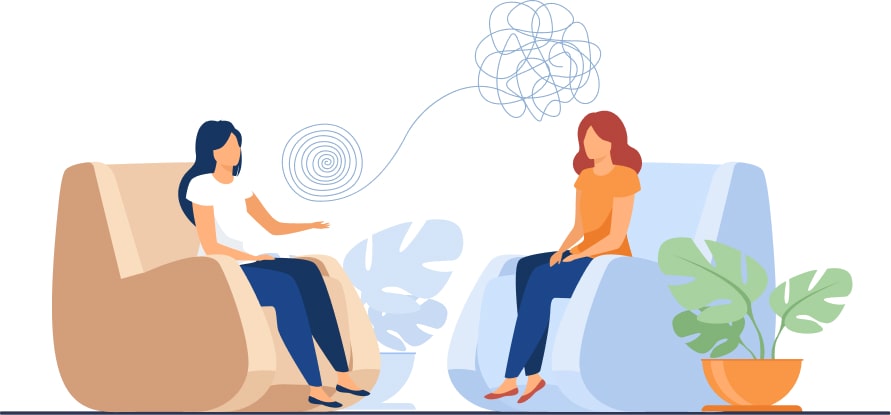Individual Therapy
What Is Individual Therapy?
Individual therapy, also known as psychotherapy or talk therapy, is a form of treatment that focuses on one on-one sessions between a psychologist or therapist and a patient. The goal of psychotherapy is to help you feel better, resolve internal conflicts, and improve mental health across the board. For most people, that means feeling stronger mentally. It also means feeling more in control and closer to achieving personal happiness and contentment. The overall goal of psychotherapy is to assist you in managing your mental health, which should also improve your overall emotional and psychological well-being. Several approaches can be taken to achieve these goals, so the focus is not on one methodology but on finding solutions that work for an individual client. Our psychologists will work closely with you to create a personalized treatment plan that will help you deal with your specific problems and feel better.
We also specialize in therapy for adolescents, teens, and kids, providing a safe and supportive environment to help young individuals navigate their mental health journey.

Areas of Practice
Therapy for LGBTQI+ issues is a vital and affirming resource for individuals within the community. It provides a safe and non-judgmental space for individuals to explore their identity, address mental health concerns, and navigate the unique challenges they may face.
LGBTQI+-affirmative psychologists are knowledgeable about the distinct experiences and social pressures faced by LGBTQI+ individuals, offering a supportive environment to help clients develop self-acceptance, build resilience, and foster healthy relationships.
Unipolar depression is marked by a sustained low mood, loss of interest or pleasure, and negative thinking patterns such as hopelessness and self-criticism. It often involves behavioral withdrawal and a reduction in rewarding activities, which further reinforces depressive symptoms.
Bipolar depression presents similarly during depressive episodes but occurs within the broader context of mood instability, alternating with periods of mania or hypomania. These individuals often struggle with emotional regulation and maintaining consistent daily routines.
We utilize Cognitive Behavioral Therapy (CBT) to address these underlying changes in thinking, behavior, and emotions, however, we may also use other adjunctive therapies based on the unique needs and preferences of the patient.
OCD is a treatable disorder, and therapy can help people manage their symptoms and improve their quality of life. We utilize a variety of therapies such as Cognitive Behavioral Therapy (CBT), Acceptance and Commitment Therapy (ACT) and Exposure and Response Prevention Therapy (ERPT) to address these underlying changes in thinking and behavior(s) that influence OCD.
Insomnia, or ‘“primary insomnia,” is characterized as either poor quality and/or quantity of sleep that affects someone’s overall abilities to function throughout their day, and/or, impacts a person’s quality of life. Typically, insomnia can impact someone’s life in the way of being fatigued the next day, having troubles concentrating, being productive in their work, school or other important areas of their lives.
Therapy addresses the thoughts, behaviors, and emotions that serve to maintain poor sleep hygiene and a sleep-wake cycle. We utilize Cognitive-Behavioral Therapy for Insomnia (CBT-I) as a first-line treatment for insomnia, and is viewed as a “gold-standard” treatment; even more-so than the use of sleep medications.
Anxiety is a future-oriented state marked by excessive worry, heightened arousal, and avoidance behaviors. It becomes problematic when it is persistent, out of proportion to the situation, and interferes with functioning. Its development is influenced by a combination of biological predispositions, a general sense of uncontrollability, and learned fears.
Phobias are intense, irrational fears of specific objects or situations that lead to avoidance or significant distress. Though the fear is often recognized as excessive, it can still be debilitating.
We utilize a variety of therapies such as Cognitive Behavioral Therapy (CBT), Acceptance and Commitment Therapy (ACT) and Exposure and Response Prevention Therapy (ERPT) to address these underlying changes in thinking and behavior(s) that influence all sorts anxieties and phobias.
Trauma can present in different forms, sometimes as early as childhood, pre-adolescent, and adolescent years, but ultimately, can be experienced at any age. In its basic form, trauma tends to bring out a classic “fight, flight, or freeze” response that can be detrimental to someone’s quality of life.
We utilize Cognitive Processing Therapy (CPT) to address the underlying thoughts, behaviors, and emotions that relate to how one views themselves, others, and their environment as it relates to key themes such as safety, trust, power/control, esteem, and intimacy. Alternatively, we may also use other adjunctive therapies based on the unique needs and preferences of the patient.

